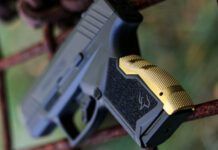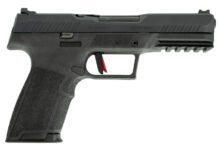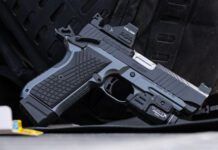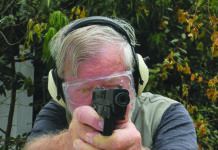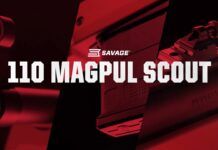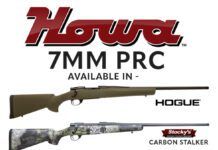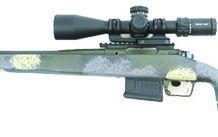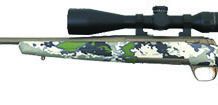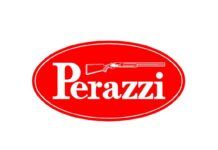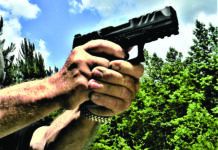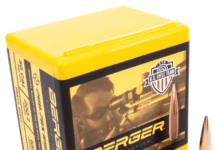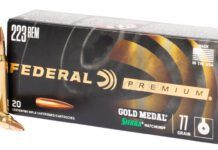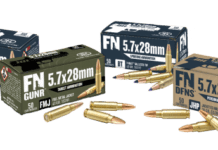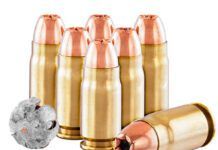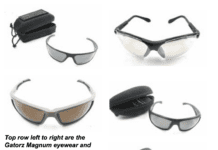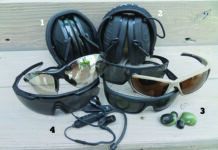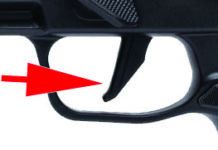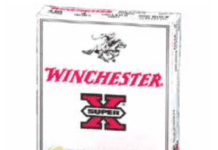We tested and evaluated a 1911A1 Professional from the Springfield Armory Custom Shop. This gun sold for $2400, or about four times the price of our Mil-Specs. The connection was that a customer can send his Springfield Mil-Spec to the Custom Shop and for $1,495, Springfield Armory will apply an upgrade in parts and workmanship called the “Professional” package.
Because we recognize that shooters may start with a Mil-Spec gun but may eventually want more performance, we wanted to report if we thought a conversion of this magnitude was worth the money. Here’s what we found.
The Springfield Armory Custom Shop offers a menu of ala carte modifications describing just about anything that can be done to a 1911 style semi-automatic pistol. The featured items on the Custom Shop’s price list are complete guns and package modifications. A package is a specified list of upgrades and modifications performed on the customer’s gun. Packages available from the Custom Shop for 1911 style pistols are the Professional, Competition, Tactical Response, Loaded, and Defense. Prices range from $175 for the Defense package to $1495 for the Professional, which according to the Custom Shop brochure is an upgrade to “the same exacting specifications as the FBI contract model.”
The Professional is a complete rebuild, including the installation of a match-grade barrel and complete refinishing. Other parts listed for installation include match hammer and sear, speed trigger, titanium firing pin with extra heavy firing pin spring, beavertail grip safety, ambidextrous thumb safety, low mount Novak rear sight with matching dovetail front sight, 3-dot tritium inserts, magwell, 20-lpi checkering on the front strap, checkered cocobolo grips, beveling of all external parts, deburr complete pistol internally, apply a “Black T” finish to the complete pistol and ship with six Metalform seven-round magazines tuned to the pistol.
Parts are important, but the Custom Shop offers hand fitting and hand checkering. For example, the benefit of the magazine well would be lost if not for a careful blend with the bevel on the frame.
Springfield prefers to work on carbon-steel-framed pistols, like the Mil-Spec tested above. We were advised that the Black T finish could overcoat the Parkerizing. Turn around time was another consideration, and currently this job would take about 24 weeks. In our experience this is about average for building a custom gun.
To preview what to expect from transforming our pistol into the Professional package, we acquired a completed Custom Shop Professional model pistol in .45 ACP. The Professional and both Mil-Specs from Auto Ordnance and Springfield Armory weighed in between 36 and 38 ounces, but the Professional felt more like one solid block of steel. The Black T finish left the frame with a slight matte exterior, but the slide was a gleaming ink-like blue. We also noticed that the barrel extended well past the bushing, probably because the tube measured 5.1 inches in length. The barrel did not have a cutaway for visual chamber check. The hood was blued and fit tightly against the breech, adding to its solid appearance.
The words Nowlin .45 ACP were barely visible on the barrel; Nowlin is a manufacturer of top-quality barrels. The standard length guide rod was retained, but the tight bushing fit required the use of a wrench. The slide-stop pin had been machined flush with the right side of the frame and beveled to prevent any possibility of it being pressed and causing a stoppage. The ambidextrous safeties were narrow but easy to use, blending in with the profile of the grips. The low-mount rear night sight by Novak was sunk cleanly into the slide, with the rear notch as far to the rear as possible. The dovetail of the front-sight blade all but disappeared into the slide. Frame checkering was ultra clean, and the magwell was melded neatly in place. The mainspring housing was flat. The grip safety did offer a raised area to ensure activation.
The Professional arrived with six seven-round magazines made by Metalform, all of which worked perfectly. Each magazine was fit with a rubber base pad to extend its length far enough below the magazine well to allow for positive loading and add durability to the magazines should they be dropped.
Our inspection revealed only one variation from what was promised. The brochure listed a custom-tuned 4.5-pound trigger pull, but we measured the trigger pull to be some 6 pounds, which was actually more in line with our production models. A call to the Custom Shop assured us that weight of trigger pull can be specified, but for carry Springfield Armory does not recommend setting the trigger to less than 4.5 pounds.
In our head to head match up of the Mil-Specs, we had deferred to the poor sights on the Auto Ordnance and collected accuracy data at 15 yards. Taking the Professional to the range, we felt no such restriction and fired 25 yards downrange from a rest to determine accuracy. We used the very same ammunition to test the Custom Shop Professional as we did in our test of the Mil-Spec models. The Federal American Eagle 230-grain FMJ rounds produced groups that varied between 2.2 and 2.5 inches. The Winchester USA 185-grain FMJ rounds varied in group size from 2.0 to 2.4 inches.
Our handload featuring the 200-grain moly-coated Precision bullet and Hodgdon Clays powder varied in group size from 1.9 to 2.6 inches. But our top performer was the Black Hills 230-grain JHP round. The Black Hills ammunition consistently printed five-shot groups measuring 1.8 to 1.9 inches across.


